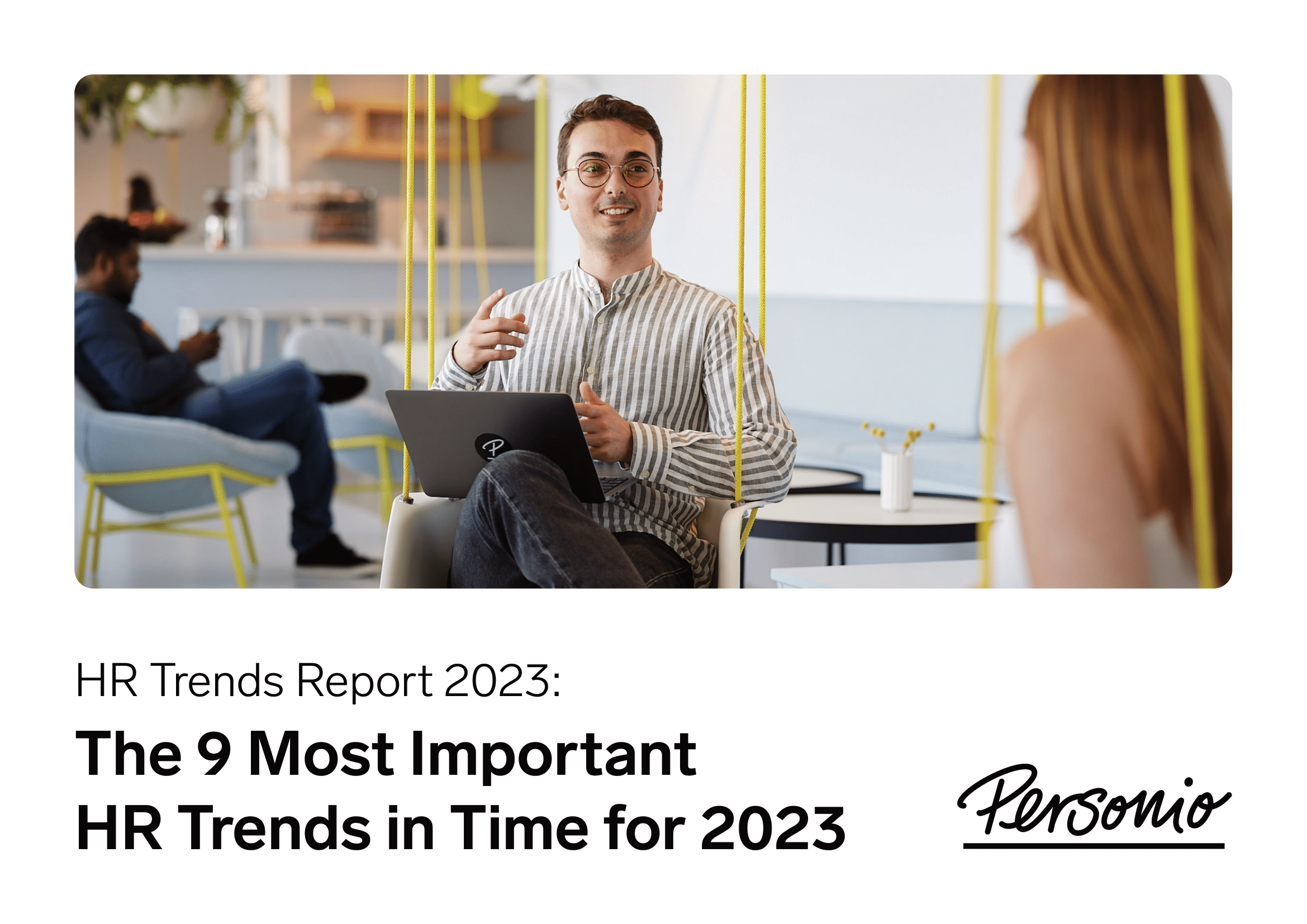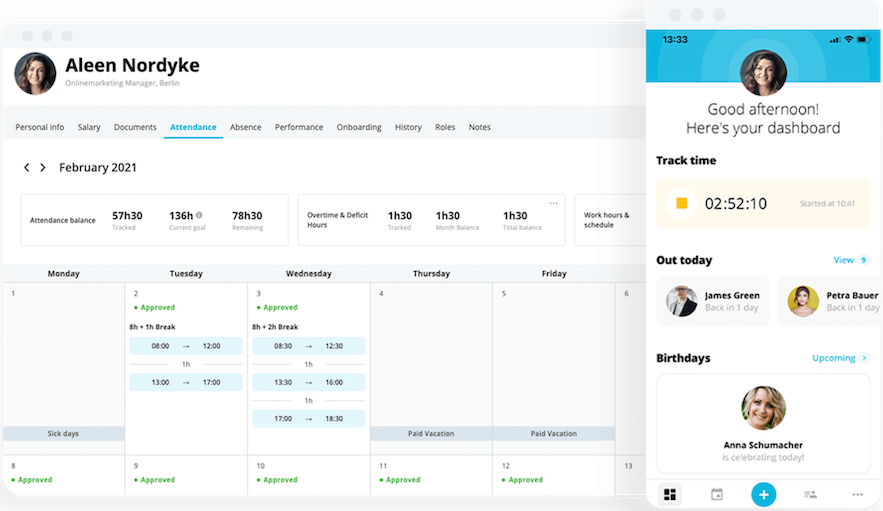The Impact of AI in HR

AI in HR may feel like a burgeoning field, but it is already changing in some fundamental ways. For functions like human resources, who have already experienced rapid upgrades in technology and automation over the past few decades, AI has the potential to be even more transformative.
How can HR professionals leverage AI to make real change in their organisations? In this article, we’ll explore the role of AI in HR and People orgs, including how teams are using it, its benefits and some of the concerns and considerations all businesses should note down.
Download our HR trends report for 2023 today.What Is the Role of AI in HR?
AI in HR relates to the use of artificial intelligence (AI) to influence, dictate and determine various HR processes along the employee lifecycle. As the presence of AI continues to increase in HR technology, we’re seeing its ability to automate key HR tasks.
This might include tasks like payroll, interview scheduling and benefits administration — but it can do so much more: from driving key decisions on hiring and retention to rapidly creating new job descriptions to analysing candidate data and predicting outcomes.
Eightfold AI surveyed 250 HR leaders in 2022 and released a report titled “The Future of Work: Intelligent by Design”, finding that a majority of HR leaders are already utilising AI across the department:
Employee records management: 78%
Payroll processing and benefits administration: 77%
Recruitment and hiring: 73%
Performance management: 72%
Onboarding new employees: 69%
Josh Bersin, a well-known and respected expert in the field of HR, recently wrote an article about how AI will disrupt the HR tech marketplace. After speaking with 20 HR tech vendors to learn about their AI strategies, he came to this conclusion:
“While it’s still early days, I believe AI (and Generative AI in particular) is going to radically change the HR Tech landscape. Not only will systems be intelligent by design, they will have powerful conversational user interfaces, they will embed multiple AI models, and new disruptors will appear.”
With these new AI capabilities built into the technology HR teams use every day, we can expect to see enhanced efficiency, accuracy and decision-making across the function.
How are HR Teams Using AI?
It’s easy to suggest that AI in HR is going to change everything. But, how are HR teams currently using AI to improve their own work? Let’s jump into more of the specifics…
1. Recruitment and Talent Acquisition
Some of the earliest uses for AI in HR have been focused on improving the recruitment and talent acquisition processes. With AI-powered tools, HR teams can automate manual tasks and streamline candidate sourcing, screening and selection to cut down on time to hire. From posting jobs to analysing resumes to sending job offers, there’s room for AIi to make improvements across the board.
When used properly and intentionally, AI can also detect unconscious bias and eliminate it from the recruitment process. Using AI-generated algorithms to screen applicants results in a more objective ranking of a candidate's abilities, preventing subjective and unreasonable assessment of skills.
2. Employee Onboarding and Training
Everyone who has joined a new company knows it can be overwhelming to experience the onslaught of paperwork, training, new information and things to remember during onboarding. Implementing AI in these processes makes it easier on both the HR team and the employee, as it can walk the employee through everything they need to do without constant HR intervention.
Once employees are onboarded, HR teams can use AI to continually support them with training, even to deliver training programmes personalised to each employee or new hire’s needs. Using an internal AI chatbot can offer continuous employee support while also enabling easier knowledge sharing.
3. Performance Management and Employee Engagement
AI can facilitate continuous real-time performance tracking, providing HR teams with accurate and objective insights on employees. Managers are able to use this to provide timely and constructive feedback that is based on objective data and improves employee productivity and engagement.
At the same time, AI-driven analytics can play a role in measuring employee engagement and satisfaction, opening up even more opportunities for HR to promote employee loyalty and prevent high rates of labour turnover.
4. HR Analytics and Data-driven Insights
AI enables HR to glean actionable insights by analysing large HR datasets. It also adds the capability of predictive analytics, helping teams to determine future patterns (e.g. an impending increase in turnover or future business-wide skills gap). As a result, HR professionals can use AI to forecast the need for future hiring programmes or proactively develop plans to upskill the existing workforce.
In summary, we can see HR teams currently using AI for the following core functions and tasks:
Recruitment and Talent Acquisition | AI can automate manual tasks and streamline candidate sourcing, screening and selection to cut down on time to hire. |
Employee Onboarding and Training | AI can create workflows that guide employees, step by step, through onboarding and training through programmes. |
Performance Management and Employee Engagement | AI can facilitate real-time performance tracking and feedback collection and analysis for both employees and their line managers. |
HR Analytics and Data-driven Insights | AI enables HR to glean actionable insights by analysing large HR datasets. |
What Are the Benefits of AI for HR Teams?
Utilising AI offers a number of benefits for the HR function, including:
More efficient processes – By automating repetitive and time-intensive tasks and projects like screening resumes and scheduling interviews, AI frees up time for HR teams so they can focus on value-adding activities.
Better and fairer decision-making – The data-driven insights and predictive analytics ensure that HR professionals are making the best decisions possible, using all the data available to them. It also can be used to make fairer decisions by minimising bias in the hiring process.
Improved employee experience – All the benefits of AI for HR teams make the work lives of employees better, too. When HR professionals have more time to spend on value-adding tasks and can even automate admin on the employee side (e.g. onboarding paperwork), they can improve the everyday experience of employees.
Cost savings – According to the McKinsey Global AI Survey, HR respondents who have adopted AI said this resulted in both reduced costs and increased revenue.
Considerations and Concerns for AI and HR Teams
When businesses consider using AI in HR, there are several important factors to consider, including ethical concerns, transparency and accountability, and regulatory frameworks.
Ethical Concerns
AI algorithms can perpetuate and amplify biases present in the data used for training. Businesses need to ensure that their AI systems are designed and trained to be fair and unbiased – for instance, the systems being used to screen resumes for hiring. Regular monitoring and auditing of AI models can help identify and address any biases that may arise.
Additionally, HR functions deal with sensitive employee data, and businesses must prioritise the privacy and security of this information. Adequate data protection measures, such as encryption and access controls, must be in place to safeguard employee privacy.
Transparency and Accountability
AI is not all-powerful; it has limitations like every other technology, so AI algorithms must be designed to provide explanations for their decisions. Human oversight and intervention must be maintained, and HR professionals need to understand the factors influencing AI-driven outcomes to ensure fairness and accountability. Critical decisions, such as hiring or performance evaluations, should involve human judgement and not be solely reliant on AI systems.
Regulatory Frameworks and Guidelines
In the UK, businesses utilising AI in HR will need to consider the relevant regulatory frameworks and guidelines, which may depend on the specific business. Guidance to consider includes:
General Data Protection Regulation (GDPR), which governs the processing and protection of personal data, including employee data. It sets out principles for lawful and fair data processing, data subject rights, and requirements for data security.
Equality Act of 2010, which prohibits discrimination based on protected characteristics such as age, disability, gender reassignment, race, religion or belief, sex, sexual orientation, etc. Businesses must ensure that their AI systems do not result in discriminatory practices.
Financial Conduct Authority (FCA) Principles – A discussion paper (DP) published by the Bank of England in 2022 was the final report of the Artificial Intelligence Public-Private Forum (AIPPF). It provided some examples of how the FCA’s rules, guidance and principles for business might be relevant to the risks AI can pose to consumer protection. This is different for every business and should be reviewed and considered with your legal team.
Businesses should also consider engaging with experts in the field, conducting regular audits and staying informed about the evolving legal and ethical landscape surrounding AI in HR to ensure compliance and ethical practices.
Weave AI Into the Fabric of Your HR Function
Ready to take the first step in leveraging AI to support your organisation?
AI-Powered Answers is an exciting new feature as part of Personio Conversations. It can serve as your team’s entry point into the world of AI for HR.
Personio Conversations provides automated help for employees, 24/7, every day of the year. It’s a single home for new and existing HR knowledge as well as any and every employee request.
Additionally, it provides employees with instant answers to routine requests through the power of AI. It also serves as a central point for your teams to organise Q&As with employees in an efficient way.
Scale your HR service delivery while introducing AI into your organisation in a meaningful way. Speak with an expert to learn more about Personio Conversations today.
Frequently Asked Questions About AI in HR
How Can AI in HR Improve Recruitment Processes?
AI enables HR teams to improve recruitment processes by automating repetitive tasks like resume screening, identifying top candidates through intelligent matching algorithms and reducing bias in candidate selection. It can also analyse large volumes of data to identify patterns and trends, enabling more informed decision-making.
Can AI-Powered HR Analytics Provide Valuable Insights for Workforce Management?
Definitely. By analysing employee data, AI algorithms can identify patterns related to employee performance, engagement and retention, and even predict future trends. This enables HR professionals to make data-driven decisions to optimise workforce planning and improve overall organisational performance.
How Does AI Contribute to Performance Management and Employee Engagement?
With AI-enabled technology, HR teams can improve performance management and employee engagement by tracking and analysing real-time performance, identifying areas for improvement, providing feedback and developing personalised recommendations for training and development. Chatbots and virtual assistants powered by AI can enhance employee engagement by making it easier to access information and get questions answered.
How Can HR Professionals Effectively Integrate AI Into Their Existing Workflows?
HR professionals should first identify specific pain points or areas where AI can add value, then select AI tools or platforms that align with their needs. Collaboration between HR and IT (or AI experts) will be key to ensure proper data integration and quality, provide employee training and regularly evaluate and fine-tune the AI systems to ensure optimal performance and user acceptance.

